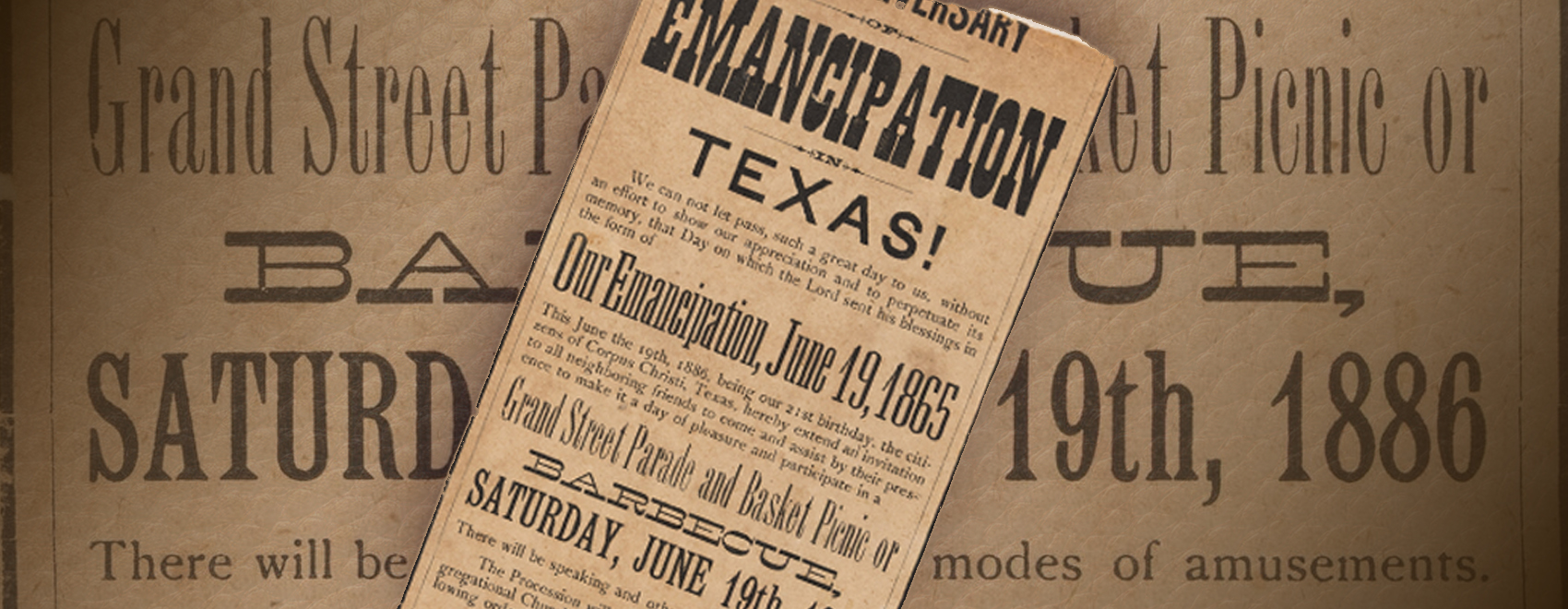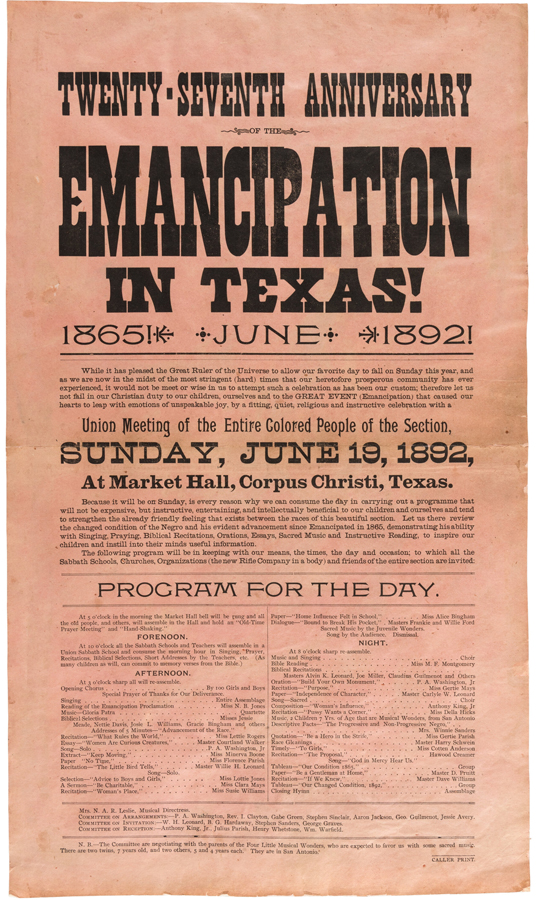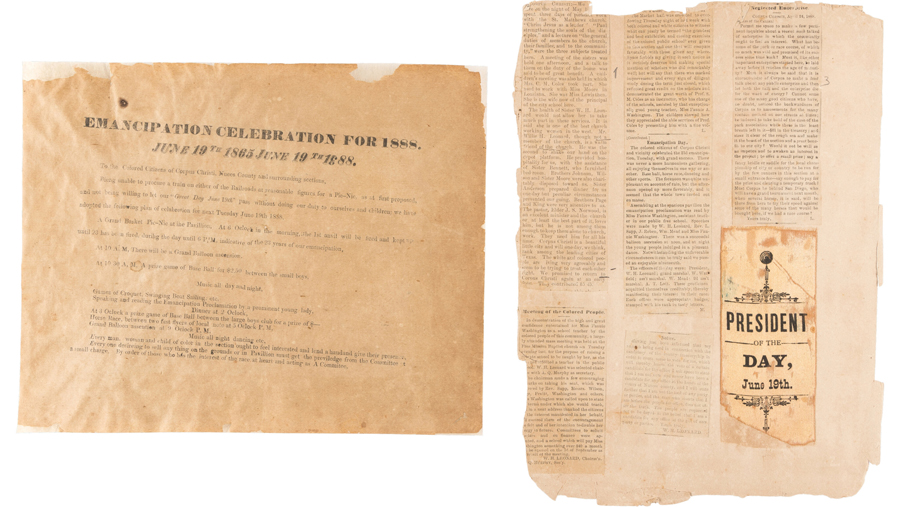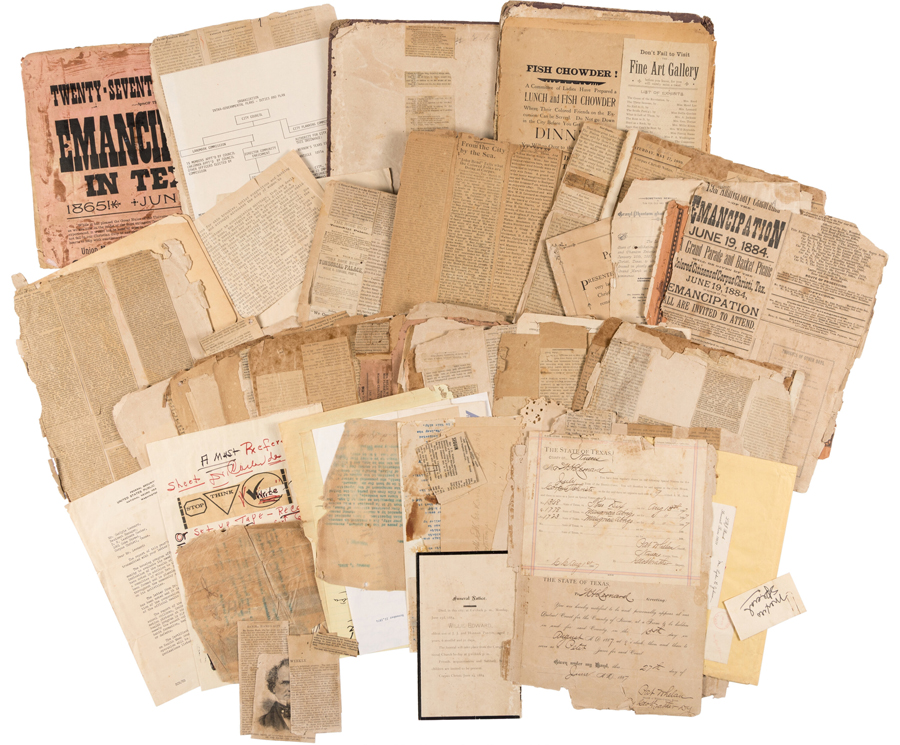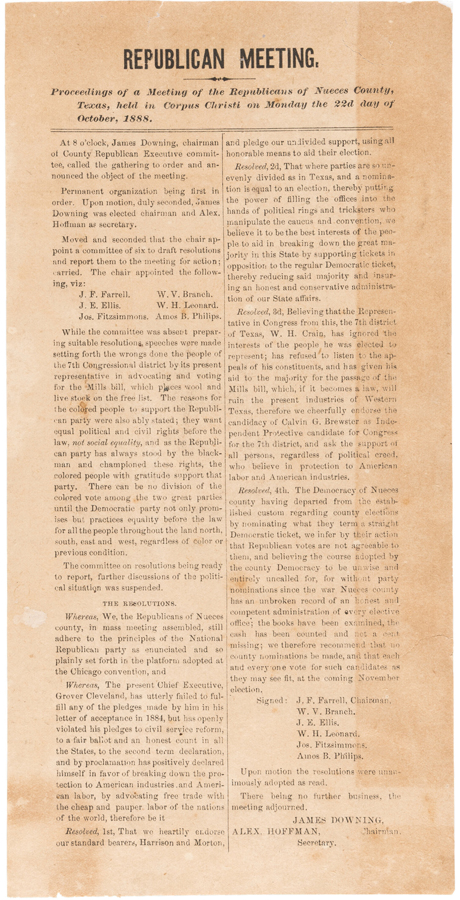THE DOZENS OF NEWS CLIPPINGS, BROADSIDES AND OTHER KEEPSAKES PAINT A PICTURE OF A VIBRANT BLACK COMMUNITY IN 19TH-CENTURY TEXAS
By Hal Parkinson | June 17, 2025
On June 19, 1865 – more than two years after Abraham Lincoln issued the Emancipation Proclamation – Union troops arrived in Galveston, Texas, and announced that all enslaved people were free. As early as 1866, Black communities commemorated the day with parades, music, prayer services and family gatherings. Although it took until 2021 for Juneteenth to receive federal recognition, in 1980, Texas became the first state to proclaim Juneteenth an official holiday.
A newly discovered scrapbook originally compiled by the Leonard family of Nueces County, Texas, sheds light on the state’s thriving and politically engaged Black community well into the late 19th and early 20th century. Although the brief period of Reconstruction brought the backlash of the Jim Crow era that lasted decades, the scrapbook’s news clippings, keepsakes and broadsides advertising early Juneteenth celebrations are testament to the bravery and resilience of the community.
Dated June 19, 1892, this broadside advertises the 27th anniversary celebration of ‘the Emancipation in Texas’ in Corpus Christi. The piece is one of several early Juneteenth broadsides available in Heritage’s August 8 Historical Manuscripts Signature® Auction.
On August 8, pieces from the Leonard family scrapbook will be available for the first time during Heritage’s Historical Manuscripts Signature® Auction.
William H. Leonard, the focus of the scrapbook, was a Black business owner, journalist and community leader. The dozens of newspaper clippings, some authored by him, record social and cultural gatherings as well as political commentary. In a profile of Corpus Christi, Leonard characterized his home city as progressive, politically diverse and tolerant of public integration. Thus, the perfect environment for the celebration of Juneteenth to become a quickly rooted tradition.
An early broadside advertising Corpus Christi’s ‘Emancipation Celebration for 1888,’ now commonly called Juneteenth. The broadside is accompanied by a scrapbook page from the archive of William H. Leonard, containing a silk Juneteenth ‘President of the Day’ ribbon and 10 newspaper clippings with reporting on the celebration, local businesses and politics.
Previously, the earliest known Juneteenth broadside to appear at auction was dated 1903; the Leonard family scrapbook contains multiple examples going back as far as 1886. The broadsides serve as bellwethers for the state of the community. Some are large and colorful, boasting a rich offering of events; others are simple affairs focusing on the meaning of the day.
After the ratification of the 15th Amendment in 1870, granting Black men the right to vote, Reconstruction-era protections enabled robust Black political participation. Many newly enfranchised citizens supported Lincoln’s Party, and by the 1880s, Black Americans made up more than 90% of Texas Republicans.
An 1888 broadside recording the proceedings and resolutions of a meeting of the Republicans of Nueces County held on Monday, October 22 is exemplary of how closely aligned the interests of Black voters were with those of the Republican Party. The attendees endorsed the Republican presidential ticket: Benjamin Harrison and Levi P. Morton; and condemned Democratic control in Texas, especially the manipulation of the election system through “rings and tricksters.” It makes a direct appeal to Black voters by invoking the Republican Party’s historic role in emancipation and equality.
As Black political interests faced growing marginalization within the major parties, many communities responded by forming their own interest groups. These groups often gathered in schools and churches, using these spaces to build coalitions and strategize for change. Leonard himself was president of the Corpus Christi Progressive Union, which was “organized for the intellectual up-building of the race.” Under his leadership, the union hosted a range of political and educational events that fostered community engagement.
This October 22, 1888, broadside details the minutes and resolutions passed at a Republican Party meeting held in Corpus Christi ahead of the 1888 presidential election. It outlines resolutions condemning President Grover Cleveland for failing to uphold promises related to civil service reform and labor protections and expresses strong support for the Republican ticket of Benjamin Harrison and Levi P. Morton.
By the turn of the 20th century, white supremacist policies had intensified, and civil rights were being swiftly dismantled. Jim Crow laws took hold, disenfranchising many Black Americans in an attempt to force them out of public life. Juneteenth celebrations also declined as millions of Black Americans moved north and communities turned their focus to the fight for voting rights. As the Great Depression set in, evidence of once-thriving Black communities in South Texas faded, and already-marginalized populations were faced with intense poverty.
The foundations of Black excellence in politics, publishing and education established during this era were not erased by white supremacy, but rather obscured by it. For decades, these achievements remained hidden from the broader historical record. Scrapbooks like Leonard’s are not just rare, but invaluable, offering a glimpse into a time of radical and rapid social progress. The collection reveals the resilience and vision that defined this pivotal moment – and the path forward it promised for Black Texans.

